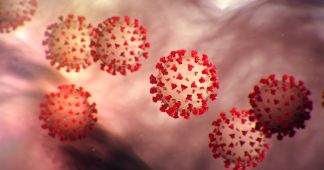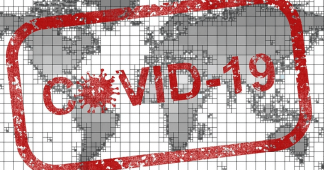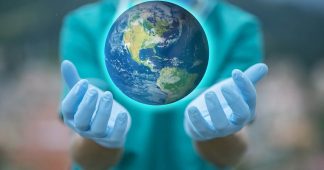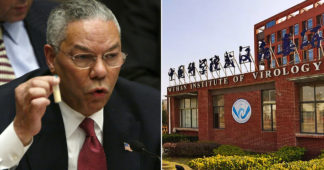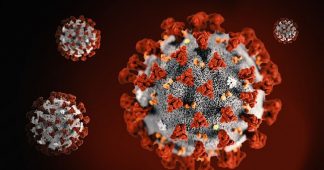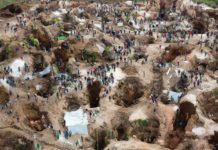Nov. 20, 2021
The virus that causes COVID-19 likely jumped from animals to humans at the Huanan wet market in Wuhan, China, according to a landmark new analysis by evolutionary biologist Michael Worobey published in the journal Science.
Worobey’s article is another nail in the coffin of the Wuhan lab conspiracy theory, concocted by the fascist ideologue Stephen K. Bannon and promoted by the New York Times, Washington Post and Wall Street Journal.
“It is yet another piece of data that points to the so-called ‘natural’ origin in the wildlife farms and market system,” said a source close to an earlier WHO-China joint study on the origins of COVID-19.
Even while grudgingly accepting that the study was a major blow to the “lab leak” theory, the media outlets that have promoted the groundless conspiracy theory have attempted to twist Worobey’s findings to undermine the World Health Organization’s study of the origins of COVID-19.
But sources close to the WHO team said they welcome the findings of Worobey’s study, saying they are fundamentally consistent with their conclusions while adding important new information.
Worobey concludes that “most early symptomatic cases were linked to Huanan Market—specifically to the western section where raccoon dogs were caged—provides strong evidence of a live-animal market origin of the pandemic.”
The study adds, “This would explain the extraordinary preponderance of early COVID-19 cases at one of the handful of sites in Wuhan—population 11 million—that sell some of the same animals that brought us SARS.”
While the WHO report recognized that the first major outbreak took place in Wuhan, and most cases were clustered around the Huanan wet market, it did not conclude that either Wuhan or the market—or even China for that matter—was the origin of the disease.
The WHO report had concluded, “No firm conclusion therefore about the role of the Huanan market in the origin of the outbreak, or how the infection was introduced into the market, can currently be drawn.” Rather than contradicting the WHO report, Worobey’s study supplements it with solid data pointing to the animal origins of COVID and the role of the Huanan market.
The proponents of the “lab leak” theory have complained that the WHO-China study was unable to supply definitive proof of an animal source for the virus. Now that Worobey has taken a big step in that direction, they are dishonestly claiming that his study contradicts or undermines the WHO’s work.
Reporting by major US news outlets, including the New York Ti mes and Washington Post, distorted the results of the study, implying that Worobey’s conclusions meant the WHO report was somehow flawed.
The New York Times began a front-page article by declaring, “influential World Health Organization inquiry had most likely gotten the early chronology of the pandemic wrong.”
The Times concludes its article with a quote from Alina Chan, a leading proponent of the Wuhan lab lie, declaring, “The main issue this points out … is that there’s a lack of access to data, and there are errors in the WHO-China report.”
Commenting on the efforts by the Times to pit Worobey’s findings against those of the WHO team, Nature reporter Amy Maxmen wrote, “Researchers learn more as they go, so I dislike how the media makes this into a dogfight.”
The Washington Post, which like the Times has promoted the Wuhan lab conspiracy theory, likewise invited promoters of the conspiracy theory to comment on Worobey’s findings. “It is based on fragmentary information and to a large degree, hearsay,” lab leak advocate David A. Relman told the Post. “In general, there is no way of verifying much of what he describes, and then concludes.”
Relman’s conclusions are absurd, since Worobey’s findings were based on publicly available data that can be checked and verified by anyone and certainly were verified prior to publication in one of the world’s premier peer-reviewed scientific publications. The Post says nothing about this.
In response, Worobey wrote:
“I am concerned about anti-scientific comments like this that reflect a desire to downplay, denigrate, or dismiss evidence that doesn’t suit the desires of advocates of a particular hypothesis (in David’s case, the lab leak hypothesis).
There is enough of this sort of “I’ll-believe-what-I-want-to-believe-in-the-face-of-all-evidence-to-the-contrary” going around these days for it not to leak further into scientific discourse.
More concerning is a strain of bias, also present in other leading proponents of lab leak scenarios such as @Ayjchan, where first-hand comments by Chinese doctors, scientists and, apparently COVID-19 patients, are easily and dismissed as lies or, here, “hearsay.”
The strength of my article is that it draws on firsthand accounts—including audio/video recordings—of doctors, hospital administrators and patients.”
The evidence is only the latest in a series of articles deepening humanity’s knowledge of how COVID-19 jumped from animals to humans. In September, an international team of scientists at the French Institute Pasteur and the University of Laos said they found a group of viruses that are the closest relatives of SARS-CoV-2, the virus that causes COVID-19.
With mounting evidence refuting the Wuhan lab lie, more and more scientists are rallying to the defense of EcoHealth Alliance President Peter Daszak, absurdly accused by advocates of the conspiracy theory of having helped create COVID-19.
In a profile of Daszak, Science cited leading scientists condemning the witch-hunt against him and his organization, EcoHealth Alliance. “It’s really awful to see this kind of witch-hunt,” said Peter Hotez, a Baylor College of Medicine global health researcher.
Responding to the Science article on Twitter, virologist Angella Rasmussen replied, “[t]here’s no evidence of scientific misconduct & they were doing critically important research.”
Science staff writer Jon Cohen wrote that Daszak “sees it as particularly unfair that, after warning about the risk of a coronavirus pandemic for more than 15 years, he is being vilified.”
Published at www.wsws.org
We remind our readers that publication of articles on our site does not mean that we agree with what is written. Our policy is to publish anything which we consider of interest, so as to assist our readers in forming their opinions. Sometimes we even publish articles with which we totally disagree, since we believe it is important for our readers to be informed on as wide a spectrum of views as possible.
